|
De Amerikaanse schrijver William Styron werd op 11 juni 1925 in Newport News in de staat Virginia geboren. Zie ook alle tags voor William Styron op dit blog.
Uit: The Long March
“One noon, in the blaze of a cloudless Carolina summer, what was left of eight dead boys lay strewn about the landscape, among the poison ivy and the pine needles and loblolly saplings. It was not so much as if they had departed this life but as if, sprayed from a hose, they were only shreds of bone, gut, and dangling tissue to which it would have been impossible ever to impute the quality of life, far less the capacity to relinquish it. Of course, though, these had really died quickly, no doubt before the faintest flicker of recognition, of wonder, apprehension, or terror had had time to register in their minds. But the shock, it occurred to Lieutenant Culver, who stood in the shady lee of an ambulance and watched the scene, must have been fantastic to those on the periphery of the explosion, those fifteen or so surviving marines who now lay on the ground beneath blankets, moaning with pain and fright, and who, not more than half an hour before, had been waiting patiently in line for their lunch before the two mortar shells, misfired—how? why? the question already hung with a buzzing, palpable fury in the noontime heat—had plummeted down upon the chow-line and had deadened their ears and senses and had hurled them earthward where they lay now, alive but stricken in a welter of blood and brain, scattered messkits and mashed potatoes, and puddles of melting ice cream. Moments ago in the confusion—just before he had stolen off from the Colonel’s side to go behind a tree and get sick—Lieutenant Culver had had a glimpse of a young sweaty face grimed with dust, had heard the boy’s voice, astonishing even in that moment of nausea because of its clear, unhysterical tone of explanation: “Major, I tell you I was on the field phone and I tell you as soon as they come out the tube I knew they were short rounds and so I hollered …” Of course it had been an accident. But why? He heard the Major shout something, then Culver had heard no more, retching on the leaves with a sound that, for the moment, drowned out the cries and whines of the wounded and the noise of trucks and ambulances crashing up through the under-brush.
It was not that he had a weak stomach or that he was unacquainted with carnage that allowed him to lose control. If anything, he prided himself on his stomach, and as for blood he had seen a lot spilled on Okinawa and had himself (although through no act of valor whatever) received a shrapnel wound —in the buttocks, a matter which even in retrospect, as he had often been forced to remind his wife, possessed no elements of comedy at all. In this case it was simply that on the one hand he himself had been shocked. The sight of death was the sort of thing which in wartime is expected, which one protects one-self against, and which is finally excused or at least ignored, in the same way that a beggar is ignored, or a head cold, or a social problem.”
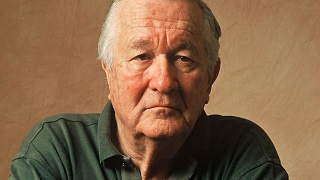
William Styron (11 juni 1925 – 1 november 2006)
De Nederlandse schrijfster Sophie van der Stap werd geboren in Amsterdam op 11 juni 1983. Zie ook alle tags voor Sophie van der Stap op dit blog.
Uit: Buiten spelen
“Die vissenkom is niet zomaar uit de lucht komen vallen. Ze had al een plekje veroverd in mijn hoofd en lag ergens, onder een stapel versere gedachten, te wachten totdat ik haar weer op zou pakken.
Op de dag voor mijn vertrek naar Parijs – waar ik naartoe ging om aan een nieuw leven te beginnen (ja dat kan) – kwam dit beeld van de vissenkom met Job aangefietst over de Lijnbaansgracht. Zoals gewoonlijk was Job niet met lege handen gekomen. Hij ging zitten op een van de lege stoelen om de keukentafel en ik schonk ons allebei een glas rode wijn in zonder te weten dat het boek dat hij dit keer voor me mee had genomen, er eentje was dat me heel lang zou achtervolgen. Of beter gezegd, leiden. Maar misschien is dat wel hetzelfde.
Op de voorkant van het boek stond een zwarte kat afgebeeld, en profil, niet zoals je je een Amsterdamse vensterbankkat voorstelt, dik en lui achter het raam, maar eentje die je voor je ziet als je aan Parijs denkt: balancerend over de glinsterende daken van de stad, de staart zelfbewust in de lucht en de pootjes elegant achter elkaar. Verder was er een stukje Parijse hemel. Boven die hemel stond de titel geschreven: Elegant als een egel. Auteur: Muriel Barbery. Ik had meteen zin om het boek open te slaan.
In het boek stelt Paloma, een hoogbegaafd twaalfjarig meisje, de vraag of het leven wel waard is om te leven als ze toch al weet hoe het eindigt: in een vissenkom. De vissenkom werkt als volgt. Je wordt erin geboren en je gaat erin dood. Je kunt een beetje naar links zwemmen en een beetje naar rechts, maar daar houdt het op. Soms raak je de wand en kijk je naar buiten, naar de wereld die erachter ligt. Het is er mooi en je kijkt lang, want daar is je fantasie nooit te groot. In de jaren na je geboorte leef je in de waan dat je leven nog alle kanten op kan schieten. Je kunt astronaut worden, bergbeklimmer, waarschijnlijk win je en passant nog een NobeIprijs voor de Vrede, en op een dag komt de prins in de witte Porsche langs gereden, hij steekt zijn hand uit en jij stapt in.”

Sophie van der Stap (Amsterdam, 11 juni 1983)
De Zuid-Afrikaans schrijver en dichter Nicolaas Petrus van Wyk Louw werd geboren in Sutherland op 11 juni 1906. Zie ook alle tags voor N. P. van Wyk Louw op dit blog.
Aanraking van de dood
Slechts rakelings streek over mijn haren
de wind van Zijn vleugelslag, en Zijn schaduw
was koelte rondom mij; ik kon niet zien
of Hij vernietiging of leven gaf,
ik kon geen laatste, dappere woorden vinden;
ik boog alleen, en rondom mij was een wand
van vrees, totdat ik kon luisteren, helemaal verblind,
hoe Hij vér wegruisde over het land.
Maar toen de vrees weggewaaid was van mijn ogen,
stond alles er nieuw bij, van vreemde smart
dooraderd en diep verbonden door alle tijden heen;
er was een grote liefde in mij, en mededogen,
en een besef van het duister in ons hart,
want alles was doorweekt van sterfelijkheid.
Vertaald door Peter Pit
Grense
My naakte siel wil sonder skrome
in alle eenvoud tot jou gaan,
soos uit diepe slaap ons drome,
soos teen skemerlug die bome
opreik na die bloue maan;
gaan met al sy donker wense,
en die heilige, nooit-gehoorde
dinge sê, waarvoor die mense
huiwer, en wat om die grense
flikker van my duister woorde.
Voël
'n Voël vlieg voor my venster verby,
'n naalddun lyn wat daaroor gly
en die glas in twee vlakke sny;
die wêrelde val apart en bly
elk in sy enkelheid geskei –
ek hierbinne, en daarbuite hy.
^
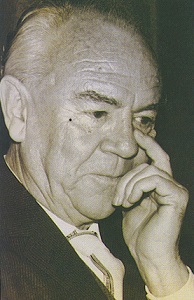
N. P. van Wyk Louw (11 juni 1906 – 18 juni 1970)
De Britse dichteres en schrijfster Renée Vivien (eig. Pauline Mary Tarn) werd geboren op 11 juni 1877 in Londen. Zie ook alle tags voor Renée Vivien op dit blog.
Lassitude
Je dormirai ce soir d’un large et doux sommeil…
Fermez bien les rideaux, tenez les portes closes.
Surtout, ne laissez pas pénétrer le soleil.
Mettez autour de moi le soir trempé de roses.
Posez, sur la blancheur d’un oreiller profond,
De ces fleurs sans éclat et dont l’odeur obsède.
Posez-les dans mes mains, sur mon cœur, sur mon front,
Les fleurs pâles au souffle amoureusement tiède.
Et je dirai très bas : « Rien de moi n’est resté…
Mon âme enfin repose… ayez donc pitié d’elle.
Qu’elle puisse dormir toute une éternité. »
Je dormirai, ce soir, de la mort la plus belle.
Que s’effeuillent les fleurs, tubéreuses et lys,
Et que meure et s’éteigne, au seuil des portes closes,
L’écho triste et lointain des sanglots de jadis.
Ah ! le soir infini ! le soir trempé de roses !
Les Arbres
Dans l’azur de l’avril, dans le gris de l’automne,
Les arbres ont un charme inquiet et mouvant.
Le peuplier se ploie et se tord sous le vent,
Pareil aux corps de femme où le désir frissonne.
Sa grâce a des langueurs de chair qui s’abandonne,
Son feuillage murmure et frémit en rêvant,
Et s’incline, amoureux des roses du Levant.
Le tremble porte au front une pâle couronne.
Vêtu de clair de lune et de reflets d’argent,
S’effile le bouleau dont l’ivoire changeant
Projette des pâleurs aux ombres incertaines.
Les tilleuls ont l’odeur des âpres cheveux bruns,
Et des acacias aux verdures lointaines
Tombe divinement la neige des parfums.
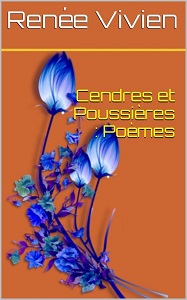
Renée Vivien (11 juni 1877 – 10 november 1909)
Cover
De Franse schrijver Jean-Pierre Chabrol werd geboren op 11 juni 1925 in Chamborigaud. Zie ook alle tags voor Jean-Pierre Chabrol op dit blog.
Uit: La banquise
“Le petit village cévenol de Bouscassel est en fête. Son unique rue, qui longe la rivière, est pavoisée de drapeaux rouges et de quelques drapeaux tricolores. Les gens rient, se donnent l'accolade à s'en étouffer, chantent des couplets de La Jeune Garde, parfois de L'Internationale mais surtout des refrains populaires arrangés pour la circonstance. Par moments, la joie s'exprime par quelques coups de feu tirés en l'air. Certains hommes en civil, arborant le brassard FFI, sont armés, qui d'un fusil de guerre allemand, qui d'un revolver... Ils ont rajouté ce qu'ils ont trouvé comme accessoires pour faire plus militaire, celui-ci un ceinturon, celui-là un casque de la guerre de 14... Il traîne là-dessus des souffles composés d'odeurs fortes où priment tour à tour la poudre, la poussière, la vinasse, la sueur et la crasse, et qui ont presque complètement étouffé le parfum des foins coupés, aux portes du village, que l'on rentrait dans les granges, il y a peu. C'est, dans l'air cotonneux de cette matinée d'un mois d'août torride, un pétillement très gai. Devant le bistrot de Marie, dite « la Rumeur » à cause de sa langue, les gens se servent librement au robinet d'un tonneau que son mari, dit « le Gamate » parce qu'il est aussi maçon, vient de mettre en perce. Le bureau de tabac a été pillé, chacun s'est servi, les premiers arrivés fument des cigares, les gosses jouent au canon avec la carotte de l'enseigne, en se gavant de réglisse. Une belle maison aux volets dos ne pavoise pas, les gens grondent en la longeant. Soudain, on se passe le mot : « Elle arrive, tous au pont !... » Sur le pont en dos d'âne, arrive une charrette aussitôt entourée d'une foule qui crie, certaines femmes hurlent à la mort. — Tipendjarén ! « Nous allons te pendre », le vieux cri, le hurlement oublié des rages populaires, semble resurgir soudain d'un lointain Moyen Age, tout naturellement, tout neuf. Au milieu de ce tombereau à ridelles tiré péniblement par un vieux percheron, sur une chaise, les mains liées derrière le dos, une femme est assise, une solide quadragénaire qui baisse la tête. Ce qu'elle a de plus remarquable, c'est une extraordinaire chevelure rousse dépeignée qui lui tombe sur les épaules et devant la figure qu'elle masque. En sautoir sur sa poitrine, une pancarte se balance au rythme du roulis qu'impriment à la charrette les coups de collier du vieux canasson sur les pavés disjoints de la calade. Cette planche porte ces mots d'une écriture maladroite mais parfaitement lisible même de loin. »
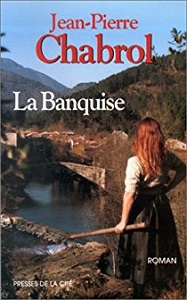
Jean-Pierre Chabrol (11 juni 1925 – 1 december 2001)
Cover
De Engelse dichter en schrijver Ben Jonson werd geboren rond 11 juni 1572 in Westminster, Londen. Zie ook alle tags voor Ben Jonson op dit blog.
Hymn To The Belly
Room! room! make room for the bouncing Belly,
First father of sauce and deviser of jelly;
Prime master of arts and the giver of wit,
That found out the excellent engine, the spit,
The plough and the flail, the mill and the hopper,
The hutch and the boulter, the furnace and copper,
The oven, the bavin, the mawkin, the peel,
The hearth and the range, the dog and the wheel.
He, he first invented the hogshead and tun,
The gimlet and vice too, and taught 'em to run;
And since, with the funnel and hippocras bag,
He's made of himself that now he cries swag;
Which shows, though the pleasure be but of four inches,
Yet he is a weasel, the gullet that pinches
Of any delight, and not spares from his back
Whatever to make of the belly a sack.
Hail, hail, plump paunch! O the founder of taste,
For fresh meats or powdered, or pickle or paste!
Devourer of broiled, baked, roasted or sod!
And emptier of cups, be they even or odd!
All which have now made thee so wide i' the waist,
As scarce with no pudding thou art to be laced;
But eating and drinking until thou dost nod,
Thou break'st all thy girdles and break'st forth a god.
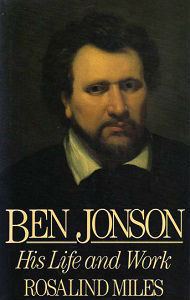
Ben Jonson (ca. 11 juni 1572 – 6 augustus 1637)
Cover biografie
De Japanse schrijver Yasunari Kawabata werd geboren op 11 juni 1899 in Osaka. Zie ook alle tags voor Yasunari Kawabata op dit blog.
Uit: Snow Country (Vertaald door Edward Seidensticker)
“Black though the mountains were, they seemed at that moment brilliant with the color of the snow. They seemed to him somehow transparent, somehow lonely. The harmony between sky and mountains was lost.'
- Yasunari Kawabata, Snow Country. Translator: Edward G. Seidensticker
Small shifts in atmosphere, in emphasis, in tone of voice or choice of words, outlined against the contantly shifting backdrops afforded by the picturesque snow country resort town and its inhabitants take on great significance in this most subtle of novels. With both grace and economy, Kawabata unfolds the story of Shimamura, a wealthy dilletante from Tokyo and his liaison with Komaka, a geisha in the hot springs resort he visits. Shimamura is taken with Komaka's innocence and simplicity; yet unwilling to fully believe that her professed love for him is real and not the pose of a geisha, or indeed that any sort of reciprocity beyond a never-defined, sporadic relationship without even the status of patron and favoured geisha is possible between them.
Both of them are, in some way, empty people, pursuing what Shimamura thinks of as wasteful effort. Shimamura, at one time a well-regarded commentator on Japanese dance and expected to soon enter into the fray himself finds his hobby getting too real and transfers his scholarly attentions to western dance, despite never having seen a ballet performance, and refusing to see ballets put up by Japanese troupes. Mountain climbing, another hobby of his, is also seen as a classic example of wasted effort - once you reach the top you have climb all the way back down again. Komako reads everything she can get her hands on, from classics to trash, and keeps a record of it all in a diary that she has been maintaining for years. She doesn't try to analyse what she reads, or impose any quality control on it - she just reads omnivourously and keeps a record of it. She teaches herself to play songs using sheet music, with no exposure to actual peformance practise, creating a naive and affecting but essentially quaint and insular art of her own. »
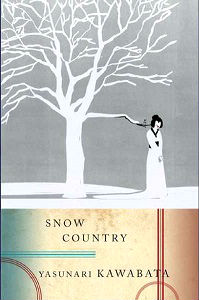
Yasunari Kawabata (11 juni 1899 — 16 april 1972)
Cover
De Zuidafrikaanse schrijver Harold Athol Lannigan Fugard werd geboren op 11 juni 1932 in Middelburg, Kaapprovincie. Zie ook alle tags voor Athol Fugard op dit blog.
Uit: Hello And Goodbye
"JOHNNIE. All right I made a mistake. I forgot. I applied. Satisfied?
HESTER. You didn't forget. You lied to me. You know you posted it.
JOHNNIE. I'm telling you I forgot.
HESTER. You knew they said you must come.
JOHNNIE. Can't I forget things too?
HESTER. And you wanted to go!
JOHNNIE. Maybe ... it's a long time ago ... ten years ... My memory....
HESTER. Don't try to get out of it.
JOHNNY [desperate] What do you want me to say?
HESTER. What are you trying to hide?
JOHNNY. Nothing. So leave me alone. Understand ? Just leave us alone. Take what you want and go! [He is squirming—then a clumsy move and the crutches fall—he stands on his feet.] Look, what you've made me do!!
[Pause.]
Yes, I wanted to go. They are the most beautiful things in the world! Black, and hot, hissing, and the red glow of their furnaces, their whistles blowing out like ribbons in the wind! And the engine driver, grade one, and his stoker up there, leaning out of the cab, watching the world like kings! Yes, I wanted to go. I could have gone. It was up to me. He didn't say anything to stop me posting the forms in duplicate. And when I got the letter saying I must come he even said he was happy because now his son would also work for the railways. I said I'd come home for all my holidays to be with him and give the house a good sweep out. And when I was packing my suitcase he gave me one of his railway shirts—even made a joke, with tears in his eyes—said it would fit when my muscles were big. So there we stood with tears in our eyes, him on his crutches—me with my suitcase. He came to the door and waved to me all the way down Valley Road.”
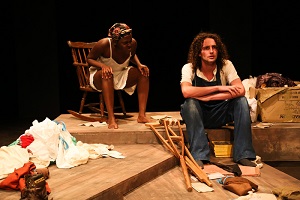
Athol Fugard (Middelburg (ZA), 11 juni 1932)
Scene uit een opvoering in Kaapstad, 2016
De Nigeriaanse dichter, schrijver, architect, en milieuactivist Nnimmo Bassey werd geboren in Akwa Ibom op 11 juni 1958. Zie ook alle tags voor Nnimmo Bassey op dit blog.
Uit:To cook a continent
« What makes possible the lack of regulation in Africa’s extractive sectors, the open robbery and the incredibly destructive extractive activities? Leading the multiplicity of factors are unjust power relations that follow from and amplify the baggage of slavery, colonialism and neo-colonialism. From a Nigerian stand-point, but within the tradition of Pan-Africanist political economy and global political ecology, this book unpacks these issues and sets up bins for these needless and toxic loads.
Because of my own experiences, the pages that follow pay close attention to the oil industry in Africa, to the history of environmental justice struggles in the Niger Delta, to the discovery of oilfields in Uganda’s rift Valley, and to the big pull of the offshore finds in the Gulf of Guinea. As we examine the impacts of fossil fuel extraction on the continent, we also look at massive land grabs for the production of agrofuels and foods for export.
What can Africa do? And once our peoples decide, can the rest of the world act in solidarity? If not, will we continue on the path laid out by elites, a path that brings us ever closer to the brink? Must we live in denial even at a time of a rising tide of social and ecological disasters?
….
One of the worst gas flares in the Niger Delta is at a former Shell facility at Oben, on the border of Delta and Edo states. They have been roaring and crackling non-stop for over 30 years, since Shell first lit them. The flared gas comes from the crude oil extracted from the oil wells in the Oben field. As at more than 200 other flow stations across the Niger Delta, these gas flares belch toxic elements into the atmosphere, poisoning the environment and the people. Globally, gas flares pump about 400 million tonnes of carbon dioxide into the atmosphere annually. Here in Nigeria, the climate is brazenly assaulted both in the short term by gas flaring and over the long term because of the CO2 emissions from this filthy practice. In the hierarchy of gas flares infamy, Nigeria is second only to Russia.”
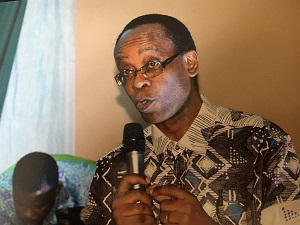
Nnimmo Bassey (Akwa Ibom, 11 juni 1958)
Zie voor nog meer schrijvers van de 11e juni ook mijn blog van 11 juni 2017 deel 2.
|



